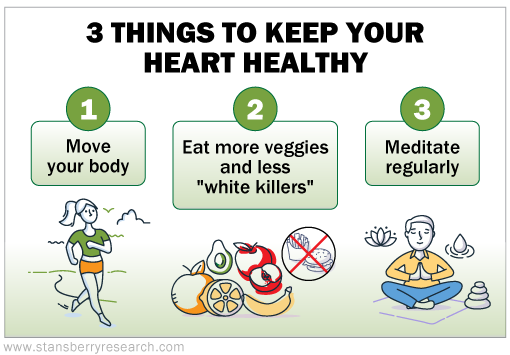Whenever you're not feeling well, everyone's going to tell you what meds to take. From your doctor to the media to your family, our society aggressively pushes us toward taking pills and "easy cure" medicine...
I can't stand it.
Look, drug companies aren't out to save the world. They're businesses, and businesses operate to make money.
And many doctors end up paying attention to the marketing messages about drugs over the reasons you got sick in the first place.
Over the years, we've seen some drugs that aren't helpful and that are instead downright dangerous, with the potential side effects far outweighing the potential benefits. And in some situations, we've seen rampant prescription drug abuse and dependence.
Take the example of the drug clopidogrel, better known by the brand name Plavix...
A 2015 article published in the journal Personalized Medicine discusses the fact that Plavix (also called clopidogrel) – a blood-thinning medication used to prevent heart attack and stroke – doesn't work for everyone. Touted as a "super aspirin," this drug is intended to help people who are at high risk of suffering the dire consequences of a blood clot (which can easily lead to heart attacks and strokes).
But 5,000 people have already sued Bristol-Myers Squibb – the company that makes Plavix – with claims that their drug has caused excessive bleeding, brain injuries, and death.
Turns out, some people have a mutation in their liver cells that reduces their ability to convert clopidogrel into its active metabolite – rendering the drug ineffective.
And many of the people with this mutation are of Asian and Pacific Islander descent, meaning the issue hit hard in Hawaii compared with other U.S. states.
So, what can we learn from this?
While many drugs can be valuable and necessary, they do have proven side effects and unknown risks. Any time you take a drug, you are potentially endangering yourself. There is no "silver bullet" that instantly, harmlessly cures any malady you might have.
I'm not saying you should dump all your meds and refuse new prescriptions. But don't choose them casually. Look for alternative ways to get the health outcomes you need. And if you are going to take a new medicine, please, please, please ask your doctors about the interaction of your family history and your genetics. It could be that the science warrants a different treatment.
And yes, it's going to force your doctors to be sure they're on top of the risks and benefits of the drug choice. But they should be... That's what they're there for after all.
And remember, your doctors, the drug company, and even the government don't care about your health like you, and we, do. We'd rather your doctor write out a prescription for movement and meditation before choosing drugs...
So, if you can, do these three common-sense things to stay in good health:

1. Move your body: Exercise strengthens your heart and other muscles... It allows your heart to pump out more blood with each beat, therefore allowing it to beat slower and maintain a good blood-pressure range.
Regular exercise optimizes your muscles by allowing them to pull oxygen from your blood more efficiently. As the need for oxygen increases, exercise even allows you to grow more blood vessels... This makes oxygen more readily available and also expands the networks of passage through which blood may travel through your body.
Do what I do and exercise for at least 30 minutes a day, five days a week. It doesn't have to be difficult stuff... One of my favorite activities to accomplish this goal is taking a 30-minute walk every day.
2. Eat more of your vegetables and less of the "white killers": White killers – like white flour, white potatoes, and white sugar – are refined carbohydrates. They can harm your heart because the processing of these foods removes the healthy elements that you get from eating whole grains. The processing also destroys the food's natural structure and as a result, the food spikes your blood sugar much higher than their less processed versions. Additionally, processing often adds harmful ingredients into these foods – like high-fructose corn syrup.
On the other hand, eating non-starchy vegetables on a regular basis can lower your blood pressure, prevent blood sugar spikes, and lower your risk of heart disease and stroke. Eating a variety of vegetable types and colors will ensure your body will get the combination of nutrients it needs.
3. Meditate regularly: Meditation primes our bodies to "rest and digest" rather than to "fight or flight." During fight or flight, our blood pressures and heart rates accelerate – ready to respond to some perceived threat. By taking us out of this state, meditation effectively lowers our blood pressure and heart rates.
I like to meditate on a regular basis. It helps my mental health as well as my physical health, too. Meditation doesn't have to last long, and it's something that you can build up over time.
Take control of your health... Don't rely on drugs to do it for you. There's power in navigating your own health outcomes. Make use of that power – it's yours for the taking.
What We're Reading...
- The Hawaii clopidogrel lawsuit: the possible effect on clinical laboratory testing.
- Something different: Butterflies provide 'extraordinary' help pollinating cotton fields.
Here's to our health, wealth, and a great retirement,
Dr. David Eifrig and the Health & Wealth Bulletin Research Team
April 27, 2021
